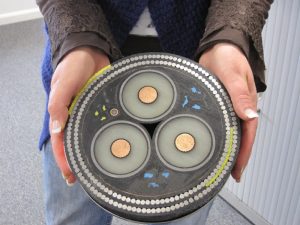The Australia-Japan-United States Trilateral Partnership for Infrastructure Investment will fund the construction of an undersea fiber optic cable for the Pacific island state of Palau, the first project the partnership has undertaken since its creation in November 2018.
According to a U.S. State Department fact sheet on the project released on October 29, the new spur cable will be Palau’s second, and will help the country meet challenges from service disruptions and fiber outages. The decision to fund the project comes at a time when strategically located islands in the Pacific are being increasingly viewed by the U.S. and its allies as being critical in their strategic contest with a militarily assertive China.
Palau linked itself to the 15,000-kilometer undersea Southeast Asia-United States (SEA-US) fiber optic submarine cable in December 2017. Funded through a loan from the Asian Development Bank, this had increased Palau’s bandwidth availability by a factor of seven and has provided internet connectivity to more than half of the country’s population of 21,685, the State Department has noted.
A Nevada-based company, Trans Pacific Networks (TPN), will build another fiber optic cable connecting Southeast Asia to the continental United States with support from the U.S. International Development Finance Corporation which was established in 2019, as the U.S. pushes against China’s Belt and Road Initiative (BRI) infrastructure projects, including digital ones. The new Palau spur cable will connect to the TPN cable, which would be the world’s longest when built.
The State Department notes that the “[t]he Palau spur project is a practical demonstration of the [Trilateral] partners’ commitment to meeting the infrastructure needs of the region and promoting secure, resilient, and trustworthy communications networks worldwide.”
U.S. Secretary of Defense Mark Esper visited Palau – part of the second island chain in the Western Pacific — in August, highlighting the country’s geostrategic importance. As one of the 15 countries in the world that recognizes Taiwan, U.S. defense department officials have demonstrated concern that China might “try to flip” Palau. Palau, on its part, remains a steadfast ally of the United States. President Tommy Remengesau had asked the U.S. to build bases in his country during Esper’s visit.
Through the 1994 Compact of Free Association (COFA), the United States funds Palau’s defense and other significant government expenditures. The COFA with Palau is set to expire in four years’ time.
The State Department also held (virtually) meetings with nearby Micronesia in June. Writing about the strategic significance of the region, The Diplomat’s contributor Grant Wyeth has noted that “[i]f the terms in which the U.S engages in Micronesia are framed solely through the lens of strategic competition with China there is a risk that it will undermine the legitimacy needed to be able to facilitate these strategic goals.”
This is precisely where efforts such as the Trilateral Partnership-funded spur cable comes in, as it stands to concretely benefit Palau’s citizens. Through the United States’ Pacific Pledge last year, the country has “committed more than $300 million in assistance to the Pacific Islands,” the State Department factsheet notes. It goes on to add that Australia has committed aid worth $1 billion over 2020-21 to the Pacific region through its Step-Up initiative and Japan, through its “All Japan” efforts, has contributed $580 million as development assistance to Pacific Island Countries since 2018.

































